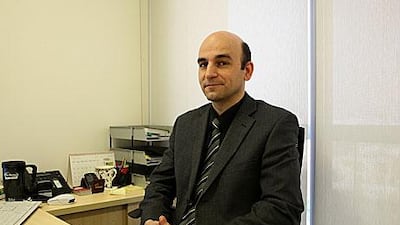ABU DHABI // Moving to the UAE can spell disaster for your waistline, expatriates have been told.
Obesity and its related health problems - already a serious issue for Emiratis, with 67 per cent of men and 72 per cent of women classed as overweight - could triple among expats in the next decade and overtake smoking as the number one cause of preventable deaths.
"When people come here they become obese," said Dr Fuad Ahmed, a consultant specialising in obesity surgery. He blamed long working hours, junk food and a climate that discouraged outdoor exercise.
"The curse of this civilisation is that we have stopped using our bodies and we eat too much," he said. "If you go back 30 years, people were more dependent on their bodies.
"Now, in this civilisation, everything is on their bottoms. Cars everywhere, lifts everywhere.
"Sometimes I see people who do not even leave their car to get their dinner. There is no activity and too much junk food. This is a problem."
Rashi Chowdhary says the number of expats who used her nutrition and weight-loss services has doubled in the past two years.
"A sedentary lifestyle coupled with finding no time to exercise, high stress levels, lack of sleep and easily available and affordable fast food is the perfect recipe for a sluggish metabolism and quick weight gain," she said.
Mrs Chowdhary said once people gained weight they searched for quick fixes such as diet pills and appetite suppressants, but still struggled with weight issues because they did not make lifestyle changes.
"There are some who are overweight for obvious reasons, like doubling their portion sizes, but there are a lot of others who skip meals or eat less because they don't find the time but are still overweight and even obese," she said. "In fact, sometimes they consume fewer calories than their recommended calorie allowance.
"Calories matter to an extent but what matters most is the source of calories and the quality. For example, 100 calories from almonds will be processed very differently compared with 100 calories from a packaged low-fat snack pack.
"It's not just about how many calories we are consuming every day but also about how poor the nutrition profile is of every calorie. If most of our calorie allowance is from good fats, great quality protein and slow carbs, it will increase the number of nutrients we consume and the amount of fat we burn."
Corey K Oliver, chief executive and founder of Original Fitness, which runs boot camps in Abu Dhabi and Dubai, said expatriates moved here with every intention of staying fit and healthy, but often got caught up in the lifestyle.
"I have seen my fair share of the Abu Dhabi or Dubai stone," he said. "People move here and they stop exercising - they get caught up in the move then swept up in the partying and champagne lifestyles and before they know it they have put on 15 to 20 kilos. They come here with every intention of playing sport or continung with the healthy habits of back home but it falls by the wayside."
Mr Oliver said the first six months of a new life abroad were the hardest on a figure - and once you have got used to the relaxed UAE lifestyle, habits can be hard to break.
For Dr Ahmed, of Burjeel Hospital, the advice was simple - watch what you eat from the start.
"It is easy to put on weight but very, very difficult to lose it," he said. "Even if you do lose the weight, there can be other problems - redundant skin, hair loss.
"The problem will not just go away. Your physique may be destroyed. It is always better to have a healthier lifestyle from the beginning."

